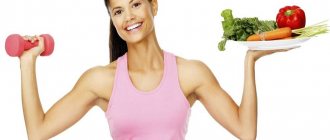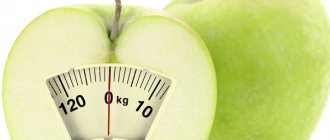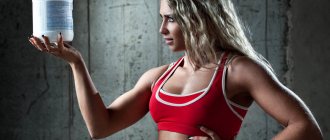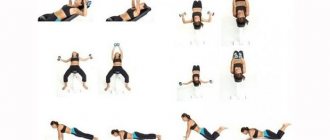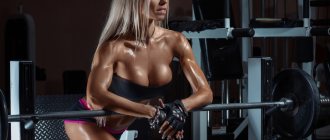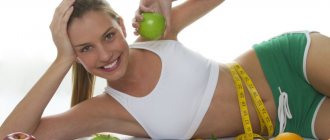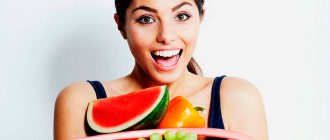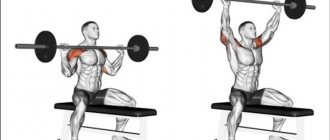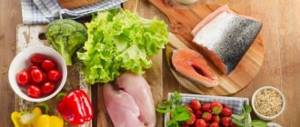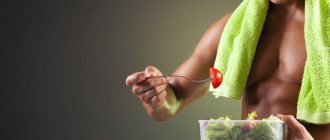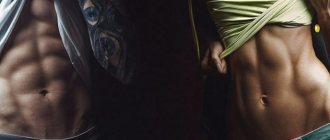The question of what to eat before training is very important when it comes to the effectiveness of physical training. The time remaining from eating before training is also important. What is the best thing to eat before a workout and what should you avoid? Many athletes prefer not to eat at all before training. Yes, this method helps those who want to lose weight. But in this case, you need to drink a protein shake or eat some protein food to prevent protein breakdown during training.
Choose whey isolate if it is important for you not only to lose weight, but also to build muscle mass. If you exercise late at night, you can drink casein protein before your workout. This will ensure that your muscles continue to grow at night while you sleep.
When to eat before training for energy
The interval between food and training is extremely important. Remember that after eating, your body needs some time to digest the food, and this requires rest. Intense exercise immediately after eating can lead to:
- abdominal pain;
- nausea;
- dizziness;
- lack of activity and other ailments.
And the training itself will be less intense and effective.
It is best to eat 2.5-3 hours before your scheduled activities. In this situation, the intensive digestion process ends before training. Therefore, you will be optimally prepared for physical activity.
You can also avoid eating at all before training. Provided that you work out in the morning. In this case, you need to plan so that after training you can eat some light protein meal within 20-30 minutes. This will help:
- saturation;
- restoration of strength;
- preventing the breakdown of your own protein tissue.
To eat or not to eat?
There is an opinion that it is best to exercise on an empty stomach, since when fats are oxidized, the body begins to quickly transform fat into energy, which is useful for losing weight. But there is a very important nuance: high calorie consumption cannot guarantee serious loss of subcutaneous fat. Don't forget that the body also takes fat from muscle tissue. After an impact workout on an empty stomach, fats that have not had time to oxidize return back to adipose tissue. This is how this mechanism works.
And for those young people who want to look athletic, worse news awaits them. Research conducted by American scientists has proven that during “hungry” training, the smart body uses up not only fat, but also muscle protein, which we work so hard to build in the gym. Carbohydrates before sports exercises are also very important. After all, with the help of them the body is “fueled” with strength and energy.
In addition, replacing breakfast or dinner with intense physical activity is harmful to health. You must remember that pre-workout nutrition is a very important aspect of losing weight. Not eating or making poor dietary choices before exercise will negatively impact your well-being. The body may respond with an upset stomach, nausea, dizziness, or even loss of consciousness. And poor health, in turn, is fraught with injury. We hope you are now convinced that eating before training is a must.
What foods are healthy before a workout?
For girls who are drying, we can recommend:
- omelette of 2-3 eggs with milk;
- baked fish, meat, chicken with salad of cucumbers, cabbage, tomatoes;
- cottage cheese or casserole without flour with eggs;
- seafood with light, non-starchy vegetables.
If your goal is to gain more energy and you do not want to lose weight, then the main meal before training should be balanced and contain carbohydrates, proteins and fats. Most of the serving should be complex carbohydrates, which provide the body with energy for a long time. Therefore, your pre-workout meal should contain whole grain cereals, wholemeal bread, or another source of complex carbohydrates. This diet is perfect for men who are cutting and building muscle mass.
In addition, it is worth eating meat or fish, which will provide the body with protein. For people who don't eat meat or fish, legumes provide an alternative source of protein.
Prohibited and permitted products
Prohibited:
- salt and sugar;
- pepper (black and red);
- sweet bakery products;
- chocolate with any additives;
- fried foods in vegetable oil (for example, potatoes);
- grapes and banana;
- fatty dairy and fermented milk products;
- cheeses;
Recommended Products:
- meat – chicken, turkey, beef;
- fish – salmon, tuna, crucian carp, carp;
- seafood – squid, shrimp, anchovy;
- vegetables - cabbage, carrots, eggplants, zucchini, beets, onions;
- fruits – orange, tangerine, apple, grapefruit;
- chicken eggs;
- dairy products - low-fat yoghurts, milk, cottage cheese, sour cream (fat content should not exceed 1-2%);
- greens – parsley, lettuce, dill;
- cereals – buckwheat, rice;
Best Meals 2-3 Hours Before Workout
It is better not to overeat before training. Small but satisfying portions are recommended 2 - 3 hours before training. This especially applies to those who want to build muscle mass:
- whole grain pasta with vegetables and chicken;
- baked fish with baked potatoes and fresh vegetable salad;
- sandwiches made from rye bread or wholemeal flour with avocado, egg and vegetables;
- turkey or veal cutlets with stewed vegetables and buckwheat, corn, and oatmeal;
- baked potatoes with meat and vegetables.
You may give preference to eggs, fermented milk products, hot first courses with meat or beans.
What to eat an hour before training for weight loss
Many trainers advise eating both before and after training. Others, on the contrary, recommend not eating half an hour to an hour before physical activity and for an hour after. If you want to lose weight, then:
- It is best to eat something light an hour before training so that you have the strength to carry it out to the fullest;
- After training, wait about an hour or an hour and a half. And only then eat a light protein dish. This way you can force the body to start breaking down fat deposits. Otherwise, if you eat immediately after activity, substances from the newly received food will be taken for recovery.
If you train in the morning, it is best to:
- drink a whey protein shake before training;
- take L-carnitine;
- wait 20 minutes or half an hour and start training.
After exercise, take a shower, rest or get ready for work. In other words, wait another 30-40 minutes. Then have breakfast with a protein dish. For example, eggs, cottage cheese, chicken, veal.
Nutrition during training
The most important condition for any workout is constant fluid intake! Even if the percentage of dehydration in your body reaches two percent, your exercise will be ineffective and the necessary intensity will be lost.
You should not focus only on the feeling of thirst.
- Exercising at a fairly active pace dampens the functioning of the receptors that are responsible for the sensation of thirst in the throat and gastrointestinal tract. And if you are already thirsty, it means that dehydration has overtaken you.
- Also, do not forget about age-related changes - over the years, these receptors lose their sensitivity. People over thirty need to drink water not out of desire, but out of necessity.
If you experience any of these symptoms that indicate dehydration:
- You feel thirsty;
- Dryness appeared in the oral cavity;
- Dry lips or even possibly cracked lips;
- Weakness and dizziness;
- Fast fatiguability;
- Severe and sharp headache;
- Nervousness and irritability;
- Complete lack of appetite.
You need to immediately drink water and stop exercising for at least a couple of minutes until you feel normal again.
You need to drink water according to this regimen: a few minutes before training, drink one glass, and during training you need to take a few sips every twenty minutes. The amount of fluid you drink will depend on how much you sweat. You must provide your body with hydration and even superhydration during the training period.
How to Eat Before a Workout to Build Muscle
About 1-2 hours before your workout, you can eat an easily digestible snack that will reduce your hunger without making you feel heavy. The best foods for this snack are those that do not contain a lot of fat, because these foods take the longest to digest. Among them:
- fresh or dried fruits;
- low fat cereal bar;
- energy bar or energy gel;
- fruit or vegetable juice.
Immediately after training, you can eat protein and carbohydrate meals. After about 10-15 minutes you can eat:
- large chop, baked in the oven;
- omelette of 3-4 eggs or 5-6 whites;
- half a chicken with vegetables;
- large fish baked on the grill.
Approximate nutrition plan for building muscle mass:
From carbohydrates, use those that are considered slow and take a long time to digest. These are the same grain crops, dried fruits, cereals.
Sample menu
For 1 day
- Early morning (06.00 – 06.30) – morning exercises, which are supported by the addition of 0.5 liters of low-fat kefir.
- At 7.00 you need to eat about 80-100g of boiled chicken breast and 100 unsalted buckwheat.
- Before 9.00 – you are allowed to drink a cup of green tea or 0.5 of still water.
- After training (9.30-10.30) it is recommended not to eat until lunch.
- Lunch (12.00-13.00) – it is recommended to eat a vegetable salad of chopped lettuce and cabbage (approximately 50-80g). Also, you need to add foods high in protein to your diet. This can be boiled fish or chicken fillet.
- In the afternoon (15.00-16.00) – a glass of yogurt with fruit salad.
- Before classes (17.00-17.30) - half a liter of water.
- Dinner (18.30-19.00) – a few baked potatoes and some carrot and cabbage salad.
- Before bed - a cup of strong tea or coffee to give the body support (caffeine).
For 1 week
All ingredients are formulated into a single whole, but their quantity must be distributed in portions and consumed within 1 day.
Monday:
- Breakfast: 150g oatmeal, 2 raw chicken eggs, half a glass of orange juice, 70g cottage cheese.
- Before lunch: a glass of low-fat yogurt.
- Lunch: 100g of boiled rice and chicken breast. 50g salad.
- Dinner: 3 baked potatoes, 200g vegetable salad, a cup of green tea.
Tuesday:
- Breakfast: muesli 100g and plus a glass of kefir.
- Second breakfast: 0.35 liters of fresh carrots and about 100 g of low-fat cottage cheese.
- Lunch: 200g steamed chicken and 100g various vegetables.
- Afternoon snack: 2 apples and 1 orange.
- Dinner: 150g of boiled unsalted beans and 100g of baked fish. 2 small tomatoes.
Wednesday:
- For breakfast: 150g oatmeal and 2 eggs.
- Lunch: 120g of cottage cheese added to fish fillet soup.
- Afternoon snack: 80-100g brown rice and 50g lettuce.
- Dinner: 150g of boiled beef and several tomatoes and cucumbers.
Thursday:
- Breakfast: fruit and milk mix – 0.3 liters of milk + 0.5 liters of grapefruit juice.
- Second breakfast: 50g of cottage cheese and 100ml of tea.
- Lunch: 2 boiled eggs and 100g identically cooked turkey.
- Dinner: 150g of beef stewed in the oven and vegetable salad.
- Before bed: a cup of green tea.
Friday:
- Before breakfast: 0.5 liters of water.
- Breakfast: oatmeal and plus 100g of steamed egg whites.
- Lunch: 150g cooked rice and 1 tomato.
- Afternoon snack: 1 apple and 1 tangerine each (medium packaged).
- Dinner: 200g of boiled chicken and 200g of low-calorie vegetables fried in olive oil.
Saturday:
- Breakfast: low-fat yogurt (0.33l).
- Lunch: 150-200g boiled salmon or pollock.
- Afternoon snack: 120g boiled rice or buckwheat. In addition, 150g of vegetable salad.
- Dinner: 200 ml of seafood soup.
- Before going to bed, you need to drink 180 ml of tea and purified water.
Sunday:
- Breakfast: omelet of 3 egg whites with 50 ml of milk. In addition, 120g of buckwheat without salt.
- Lunch: curd mixture of 150g low-fat cottage cheese and one mango cut into slices.
- Afternoon snack: a glass of yogurt and a few slices of strawberries.
- Dinner: 200g chicken and 150-200g vegetable stew.
What foods should you avoid when exercising?
Each of us, regardless of our goals, should avoid heavy foods that cause stomach discomfort. In any case, you should avoid:
- fast food;
- fatty and overly spicy foods;
- too sweet foods;
- confectionery products;
- sweet carbonated drinks.
It is better to avoid foods that cause bloating. After intense effort, the body needs foods that will help restore and replenish muscle glycogen stores.
The best post-workout meals
If your goal is to lose weight, try to eat small meals throughout the day. Don't take long breaks because you're exercising. It is necessary to give the body adequate nutrition. But at the same time, don't overeat. The serving should be about the size of your palm. However, it must contain all useful substances. Such perfection is difficult to achieve, but possible. The following dishes will suit you:
- bulgur or dark rice with lean meat and vegetables;
- durum wheat pasta with mozzarella and vegetables;
- cottage cheese with yogurt without additives;
- a sandwich made from whole grain bread with vegetables and a boiled egg;
- oatmeal with fruit;
- stewed vegetables with chicken or veal.
After training, it is very important to drink a lot. It is water that can start the fat burning process. If you don't drink enough, then your metabolism will slow down. And the body will experience stress, conserving fat reserves.
Also read the article about proper nutrition during training.
Before the power
The goal of strength exercises is not weight loss, but a rapid increase in muscle volume and they require large energy expenditures. To accumulate it, complex carbohydrates are needed, and the growth of muscle cells cannot occur without protein, which is the supplier of necessary amino acids, so the meal before strength training should include proteins, carbohydrates and not contain fats. Half an hour before going to the gym, many athletes drink a protein shake, which promotes rapid muscle growth. Before strength training you can eat:
- rice, coarse wheat pasta with poultry;
- boiled potatoes with fish;
- porridge with eggs;
- cottage cheese with berries, fruits or bread;
- omelette with vegetables or cheese and whole grain bread.
Eat in small portions, after eating there should not be a feeling of heaviness in the stomach that will interfere with exercise. In addition to the snack options suggested above, before strength training, you can drink a cup of strong coffee, but without adding sugar or cream. This drink promotes the production of norepinephrine, which accumulates energy for training from human fat deposits. As a result, the effectiveness of exercise will increase, and glycogen and amino acids will be consumed less.
- How to spot internal bleeding
- Is wiping harmful to health and others? Is there any harm from vaping without nicotine?
- Sinusitis: symptoms and treatment in adults
